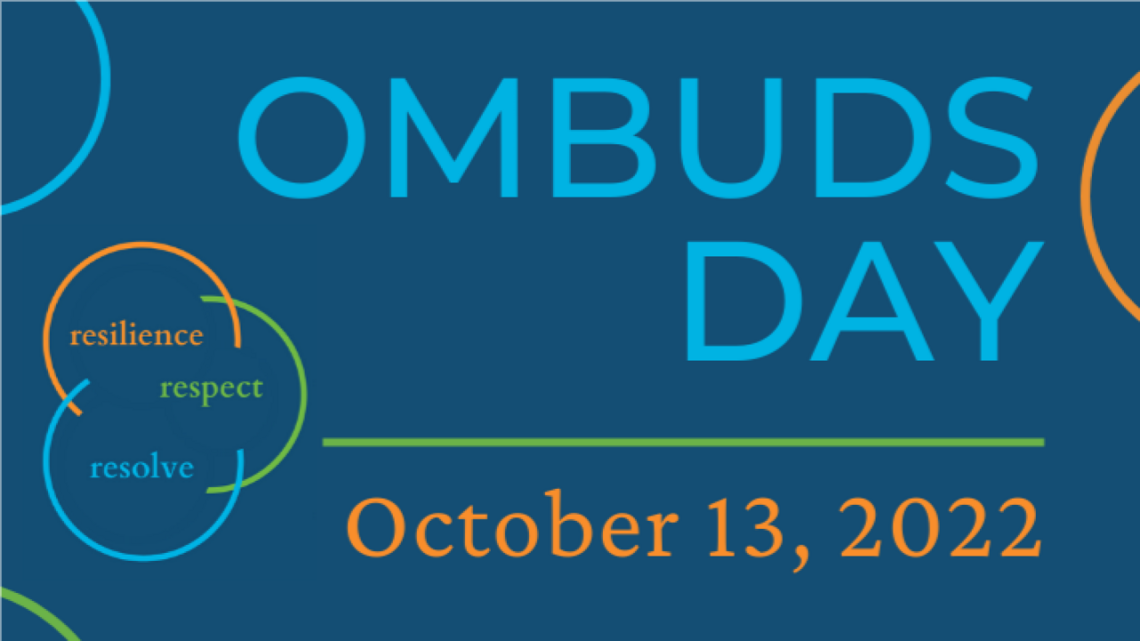
With the start of the semester, I am getting to know many new faculty, staff, and students. One of the biggest questions I get (after my new acquaintance struggles over the word “ombuds”) is, “What does an ombuds do, anyway?”
First things first: how do you say it?
This is one that lots of folks struggle with. For a five-letter, two-syllable word, there are apparently many alternate pronunciations. The most common is for people to slip in an extra “s” (“omsbuds”). If you’ve done that around me and now feel self-conscious, don’t worry; I’ve even heard ombuds do it.
The accepted pronunciation is “om” with a short o, rhyming with “Tom,” and “buds” with a short u, rhyming with “suds.” So “ombuds” rhymes with “Tom suds.”
“Ombud” is originally a Swedish word that translates as “representative,” and the role has a long tradition in Scandinavian society. According to Swedish law professor Stig Jagerskiold, the office of Civil Ombudsman, which began with the Swedish Constitution of 1809, drew on earlier antecedents.
There are currently many constructions of “ombuds.” As ombuds offices proliferated throughout the 20th century, their incumbents were almost always called “ombudsmen” and were almost (but not always) men. With a shift towards greater gender equity, there has been a drive for more gender-neutral terminology. Both “ombudsperson” and “ombuds” have become common, with “ombud” appearing as well.
My official title at UNLV is “Ombuds,” which is both gender neutral and short (remember, five letters and two syllables). Once more, it rhymes with “Tom suds.”
So what does an ombuds do?
It is important to distinguish between different kinds of ombuds. A classical ombuds is a government official who receives and investigates complaints. While a classical ombuds does not make binding orders, they have broad powers to publish findings and recommendations based on their inquiries. An advocate ombuds acts to safeguard the fairness of treatment for specific groups, such as health care patients. Legislative and media ombuds work in legislatures and news organizations, respectively, and generally act as independent officers empowered to investigate and/or advocate on behalf of those organizations’ constituencies.
An organizational ombuds, which is the type of office UNLV has, does not conduct investigations or advocate for individuals. What, then, do they do?
First, and most importantly, the Ombuds is there to listen, confidentially, to the issues and concerns that visitors bring to the office. That is an important function. Often, visitors need to have a neutral, independent person hear what they have to say, giving them a chance to reflect, before they can move to seek resolution for their concerns.
Visitor concerns usually fall into one of three categories. Transactional concerns are straightforward questions about how to accomplish a goal, like submitting the paperwork to change a job classification. Policy concerns are usually more complex, as the visitor has a goal, but a system or university policy may be getting in the way of reaching it. Finally, interpersonal issues involve conflict with another person on campus—usually a supervisor, direct report, or close peer. The Ombuds is available to listen confidentially to all of these concerns—and more.
The Ombuds’ next function, to educate, manifests differently depending on the nature of the concern. A transactional concern might be addressed by pointing the visitor to the requisite guidelines or procedure. A policy concern might include that step but could also involve brainstorming other options if a policy blocks direct fulfillment of a desire, or considering the most appropriate channels for appealing or changing the policy.
Those bringing interpersonal concerns rarely have easy policy or procedure “fixes.” If they did, they would have resolved the issue themselves. Here, the “education” function means helping the visitor explore all angles of the conflict. That includes considering the range of options available for resolution, and coaching on how the visitor can more effectively advocate for themselves.
One of the alternatives for resolving an interpersonal conflict, mediation, is the core of the third function of the Ombuds Office. The Ombuds oversees UNLV’s mediation practice. Staffed by a mix of faculty, staff, and advanced law students who have successfully completed a mediation essentials course, the mediation practice is a venue for structured but informal resolution of conflicts outside of administrative channels.
The fourth function of the Ombuds is to report on systemic inequities and other issues. Often, my awareness of these issues starts with those who bring a transactional or policy concern to the office. The goal is not to advocate for the needs of an individual, but to help UNLV as an institution become more equitable. That doesn’t mean that, if you are the only person raising a concern, it won’t be passed on; it may, in fact, have implications for others in similar circumstances, which would make it systemic rather than idiosyncratic in nature.
Circling back to the second function (‘educate”), the Ombuds Office also sponsors a robust catalog of seminars, workshops, and programs, both for a broad campus audience and for specific units. You can see a list of upcoming events on our website. These programs are intended to help the campus community better understand conflict and how it can be resolved.
A second footnote: the “mediate” function also includes facilitation, a similarly structured but informal process. Let’s say your unit wants to have a serious talk about their future and would like a neutral party to lead the meeting. The Ombuds Office can offer the services of a trained facilitator from the ranks of our campus mediators.
Whether you are a student, faculty member, or other UNLV employee, the Ombuds Office has many things to offer you. If you are having an issue and are uncertain where to go, it is an excellent zero-barrier first stop. If you would like to talk privately and confidentially about any work- or campus-related concern, please make an appointment with the Ombuds. Our door is open.
David G. Schwartz
UNLV Ombuds